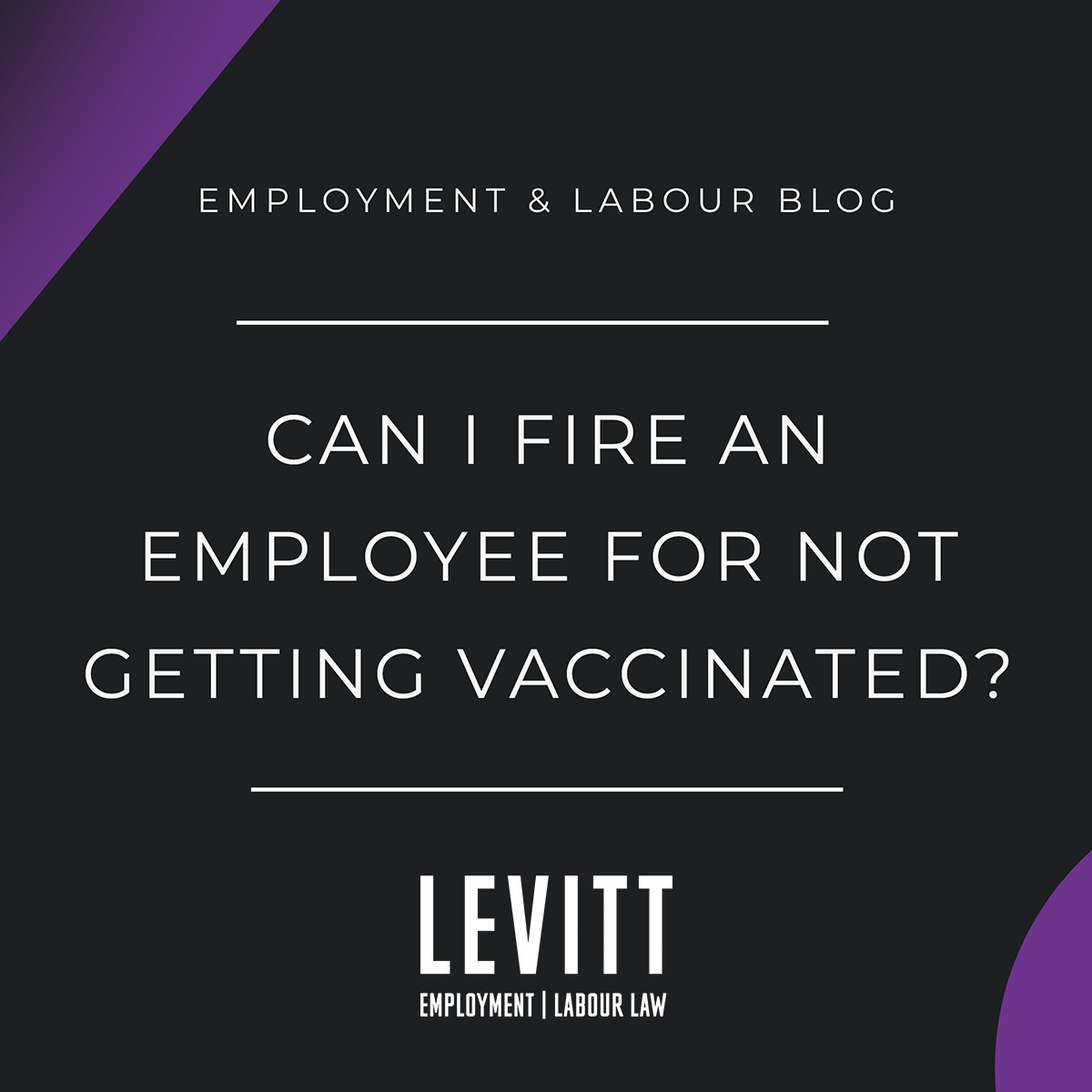Can I Fire an Employee for Not Getting Vaccinated?
Employer’s Duty to Maintain a Safe Workplace
Employers in Ontario have an ongoing duty to provide a safe workplace. This requirement is enshrined in the Ontario Occupational Health and Safety Act (“OHSA”) and includes protecting workers from hazards related to infectious diseases. However, neither OHSA nor the Employment Standards Act directly address vaccination policy enforcement as a protection mechanism.
Termination Without Cause and For Cause
During these unprecedented times, many employers and employees are wondering whether employees can be terminated without cause and/or for cause for failing to get the COVID-19 vaccine.
In a unionized workplace, the collective agreement determines whether an employer may terminate an employee for “just cause” if the employee refuses to be vaccinated.
In a non-unionized workplace, provincially regulated employers have the right to terminate employees’ employment without cause for failing to get vaccinated. However, they should ensure that they are not discriminating against the employee in doing so. If a termination is found to be discriminatory under the Ontario Human Rights Code, the terminated employee may have a human rights claim or a wrongful dismissal claim against the employer.
Depending on the circumstances, non-unionized employees in Ontario may also be terminated for cause pursuant to a mandatory vaccination policy. The validly of such a policy would depend on the employment context, such as the nature of the workplace. It is also important to ensure that mandatory vaccination policies are drafted in a way that explain why they are required, what the requirements for complying with the policy are and what the consequences of incompliance are.
Mandatory vaccination policies should be carefully drafted for employers by trusted legal counsel. Counsel can also assist employees in interpreting the legal effect of a policy drafted by an employer and its application to the employee’s circumstances.
Discrimination and the Ontario Human Rights Code
Some employees may be opposed to getting vaccinated for religious or medical reasons. They may be accorded protection under the Ontario Human Rights Code (the “Code”).
According to the “Code”, employees have a right not to be discriminated against on the basis of their religion, their disability or another enumerated ground. However, not every medical condition is a type of disability within the meaning of the Code. In the case of disability, the onus is on employees requesting an exemption from vaccination policies to provide specifics of the disabilities that they claim impact their ability to get vaccinated (without breaching their privacy) to engage the employers’ duty to accommodate.
There are certain requirements for proving that a belief meets the threshold required to be considered a religious exemption. Further, political beliefs are also not considered a protected ground of discrimination under the Code.
Employers’ Duty to Accommodate to the Point of Undue Hardship
The Code stipulates that an employer has a duty to accommodate employees based on Code-protected grounds up to the point of undue hardship. Undue hardship could include health and safety risks and financial hardship, and the employer bears the burden of proving the undue hardship once a Code-protected ground is established.
In a wrongful dismissal lawsuit, if an employer fails to prove they have accommodated an employee to undue hardship before the termination, the employer may face liability in the form of damages.
Mandatory Vaccination in Hospitals and Other Health Care Settings
The government has mandated vaccination in hospitals and certain health care settings.
Since August 25, 2021, a provincial government regulation requires organizations to comply with “any advice, recommendations and instructions” issued by the Office of the Chief Medical Officer of Health (CMOH), or by a medical officer of health after consultation with the Office of the CMOH regarding vaccination policies.
The CMOH has recently issued Directive #6, which concerns the implementation of a mandatory COVID-19 Vaccination Policy for employees, staff, contractors, volunteers and students in certain health care settings, including:
- Public hospitals within the meaning of the Public Hospitals Act,
- Service providers within the meaning of the Home and Community Care Act, 1994 with respect to their provision of community services to which that Act applies,
- Local Health Integration Networks within the meaning of the Local Health System Integration Act, 2006 operating as Home and Community Care Support Services with respect to the provision of community services and long-term care home placement services, and
- Ambulance Services within the meaning of the Ambulance Act, with respect to paramedics
For information on compliance with the policy requirements of CMOH Directive #6, please contact our firm.
Please note that this article is only to be used as general information and it does not constitute legal advice. We encourage employers and employees to contact Levitt LLP directly to better understand vaccination-related issues and seek legal advice to their questions.

